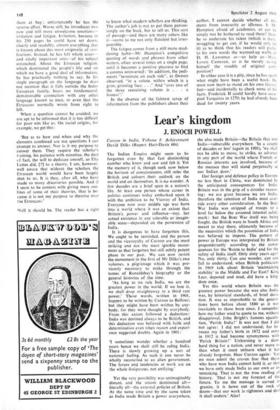Lear's kingdom
J. ENOCH POWELL
Curzon in India, Volume I: Achievement David Dilks (Rupert Hart-Davis 60s) The Indian Empire might seem to be forgotten even by that fast diminishing number who knew and saw and felt it. Yet the memory of it, though sunk now below the horizon of consciousness, still rules the British and colours their outlook on the world and on themselves. It is no wonder. A few decades are a brief span in a nation's life. At least one person whose career in politics continues today embarked upon it with the ambition to be Viceroy of India. Everyone now over middle age was born into a world where it was an axiom that Britain's power and influence—nay, her actual existence in any tolerable or imagin- able sense—depended on the possession of India.
It is dangerous to have forgotten this. We ought to be reminded, and the person and the viceroyalty of Curzon are the most striking and not the most ignoble monu- ment to that forgotten but still subtly potent phase in our past. We can now revisit the monument in the first of Mr Dilks's two volumes, a pilgrimage which it was pre- viously necessary to make through the tomes of Ronaldsbay's biography or the general histories of the time.
`As long as we rule India, we are the greatest power in the world. If we lose it, we shall drop straightaway to a third rate power.' Those words, written in 1901, happen to be written by Curzon to Balfour; but they might have been written by any- body, for they were thought by everybody. From this axiom followed a deduction: India was destined always to be British, and this deduction was believed with faith and determination even when reason and experi- ence suggested doubts. Again in 1901: `I sometimes wonder whether a hundred years hence we shall still be ruling India. There is slowly growing up a sort of national feeling. As such it can never be wholly reconciled to an alien government. The forces and tendencies at work are on the whole fissiparous, not unifying.'
Yet the very possibility was unimaginably distant, and the axiom dominated all— literally all—the external policies of Britain. At the same time and by the same token as India made Britain a power everywhere, she also made Britain—the Britain that was India—vulnerable everywhere. 'In a couple of decades or less' (again in 1901), 'we shall not be able to move, to strike, to advance in any part of the world where French or Russian interests are involved, because of the menace that will stand perpetually at our Indian door.'
Our foreign and defence policy in Europe. no less than in China, was dominated by the anticipated consequences for India. Britain was in the grip of a circular reason- ing: we are great because we are India: therefore the retention of India must over- ride every other consideration. In the Boer War India was stripped of troops to a level far below the assumed iaternal safety mark: but the Boer War itself was being fought, the British were in South Africa and meant to stay there, ultimately because of the necessities which the possession of India was believed to impose. The pattern of power in Europe was interpreted by Britain preponderantly according to the conse- quences for the `Route to India' and for the safety of India itself. Only sixty years ago? No, only thirty. Can one wonder, can one fail to understand, when British politicians in 1969 talk about Britain 'maintaining stability' in the Middle and Far East? King Lear, deposed and mad, did have a king- dom once.
Yet this world where Britain was the greatest power because she was also India. was, by historical standards, of brief dura- tion. It was as improbable to the genera- tions born before about 1880 as it was inevitable to those born since. I remember how my father used to quote to me, without disapproval, John Bright's famous ejacula- tion, 'Perish India!' It was not that I did not agree: I did not understand; for be- tween my father's birth in 1872 and mine in 1912 it had become synonymous with `Perish Britain!' Unlearning is a slow. hard thing for a nation, and never more so than when it must unlearn what it has already forgotten. Hear Curzon again: 'Let no man admit the craven fear that those who have won India cannot hold it, or that we have only made India to our own or its unmaking. That is not the true reading of history. That is not my forecast of the future. To me the message is carved in granite, it is hewn out of the rock of doom—that our work is righteous and that it shall endure.' Alas!


































 Previous page
Previous page